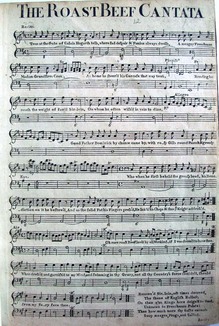William Hogarth’s London
The Practitioners of Musick will present a concert at 3:00 Sunday November 13, 2011 in Firestone Library’s main gallery, which will feature a performance of the rarely heard Roast Beef Cantata.
The musicians will include John Burkhalter, English & small flutes; Clara Rottsolk, soprano; Donna Fournier, Baroque cello; and Donovan Klotzbeacher, harpsichord. For more information, see http://rbsc.princeton.edu/hogarth/.
According to Grove’s Dictionary of Music, The Roast Beef of Old England was an English national song whose tune has become associated with the serving of dinner at public functions, and occasionally used as a signal for the same in the army. The air is a fine marked specimen of English melody, and is probably the composition of Richard Leveridge, who doubtless sang the song in public. The first two verses were inserted in Henry Fielding’s ballad opera, Don Quixote in England, produced in 1733. They are considered to be by Fielding himself, and are marked as to be sung to the air The Queen’s old Courtier.
Other sources indicate there were three versions of the words of this song: the original two verses by Fielding (1731); Leveridge’s six verses, the first being simply an appropriation of Fielding’s; and The Roast Beef Cantata, by Theodosius Forest, as seen in William Hogarth’s print, The Gate of Calais (1748).
Here are a few lines:
THE ROAST BEEF CANTATA.
‘Twas at the gate of Calais, Hogarth tells,
Where sad despair and famine always dwells,
A meagre Frenchman, Madame Grand-sire’s cook,
Ah home he steered, his carcase that way took.
Bending beneath the weight of famed Sirloin,
On whom he’d often wish’d in vain to dine,
Good Father Dominick by chance came by,
With rosy gills, round paunch, and greedy eye;
Who, when he first beheld the greasy load,
His benediction on it he bestowed;
And as the solid fat his fingers press’d,
He lick’d his chaps, and thus the knight address’d:
“Oh, rare roast beef, lov’d by all mankind,
If I was doom’d to have thee, when dress’d and garnish’d to my mind,
And swimming in thy gravy, not all thy country’s force combin’d
Should from my fury save thee.
Hogarth’s print and the broadside with the poem are both on view in our gallery.
